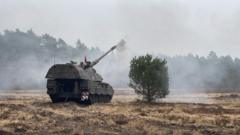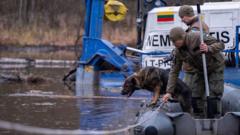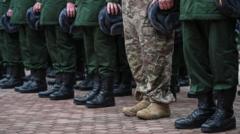In a decisive move reflecting shifting attitudes towards military engagement, Germany has voted to significantly enhance its military budget, aiming to fortify its defenses against perceived threats from Russia. This monumental change comes on the heels of the ongoing conflict in Ukraine, compelling the nation to reconsider its historical stance on military might. With overwhelming support from parliament to exempt defense spending from stringent debt guidelines, Germany finds itself at a crucial crossroads, preparing to boost its armed forces amidst fears of potential hostilities from Moscow.
Germany Embraces Military Expansion Amid Rising Tensions with Russia

Germany Embraces Military Expansion Amid Rising Tensions with Russia
As the spectre of aggression looms, Germany pivots from pacifism to substantial defense investment.
The Bundeswehr, Germany's military, has received authorization for a substantial financial boost, essential according to General Carsten Breuer, amid concerns that Russian aggression may extend beyond Ukraine. A recent military training exercise in Munster has highlighted the urgency of the situation. The general warns that the North Atlantic Treaty Organization (NATO) must ready itself for possible Russian attacks, potentially occurring within the next four years. Breuer asserts, "We are threatened by Putin... the sooner we prepare, the better," as he emphasizes the need for immediate action to deter further threats.
Historically, Germany's identity has been one of caution toward military action, particularly as many Germans have been raised on the moral lessons of the world wars. However, the full-scale invasion of Ukraine has catalyzed a profound transformation in public perception regarding defense spending and the necessity of military preparedness. "There are lots of Germans who still feel strange about big investments in our military," acknowledges Ludwig Stein, yet he admits that the changing geopolitical landscape demands a reevaluation of priorities.
In a significant shift, Chancellor Olaf Scholz previously initiated a "Zeitenwende," pledging €100 billion to modernize Germany’s military in response to rising Russian aggressiveness. However, General Breuer insists this investment remains insufficient, as the Bundeswehr currently faces critical shortages, from troops to ammunition. A recent parliamentary report deemed the military to have "too little of everything," underscoring the urgency of improvements.
The lifting of Germany's debt cap will permit a steady flow of funding aimed at remedying these shortcomings, a move that has raised eyebrows but reflects the seriousness with which the new government views national defense. Additionally, a noteworthy recent poll indicates that public sentiment is shifting; a significant majority of Germans now view Russian President Vladimir Putin as a considerable threat to European peace.
As the nation grapples with its military past, younger generations like 18-year-old Charlotte Kreft express an evolving perspective on military involvement—balancing a legacy of pacifism with the current need to defend democracy and freedom. The defense chief’s call for a return to military conscription has sparked debate, as Germany aims to bolster troop numbers significantly.
General Breuer has made it clear that a robust military is essential for safeguarding Germany and fulfilling its NATO obligations. "Are you ready for war?" he poses to audiences in regional meetings, emphasizing the necessity of preparing for potential threats. With rising tensions and an isolationist U.S. foreign policy, the urgency for Germany to adapt its military strategy has never been more pressing.
As Germany steps into this new chapter, the implications for its role in European security and its historical approach to warfare will be closely watched by the global community. In response to today's geopolitical landscape, the question remains: how will Germany reconcile its past with the need for a resolute military stance?
Historically, Germany's identity has been one of caution toward military action, particularly as many Germans have been raised on the moral lessons of the world wars. However, the full-scale invasion of Ukraine has catalyzed a profound transformation in public perception regarding defense spending and the necessity of military preparedness. "There are lots of Germans who still feel strange about big investments in our military," acknowledges Ludwig Stein, yet he admits that the changing geopolitical landscape demands a reevaluation of priorities.
In a significant shift, Chancellor Olaf Scholz previously initiated a "Zeitenwende," pledging €100 billion to modernize Germany’s military in response to rising Russian aggressiveness. However, General Breuer insists this investment remains insufficient, as the Bundeswehr currently faces critical shortages, from troops to ammunition. A recent parliamentary report deemed the military to have "too little of everything," underscoring the urgency of improvements.
The lifting of Germany's debt cap will permit a steady flow of funding aimed at remedying these shortcomings, a move that has raised eyebrows but reflects the seriousness with which the new government views national defense. Additionally, a noteworthy recent poll indicates that public sentiment is shifting; a significant majority of Germans now view Russian President Vladimir Putin as a considerable threat to European peace.
As the nation grapples with its military past, younger generations like 18-year-old Charlotte Kreft express an evolving perspective on military involvement—balancing a legacy of pacifism with the current need to defend democracy and freedom. The defense chief’s call for a return to military conscription has sparked debate, as Germany aims to bolster troop numbers significantly.
General Breuer has made it clear that a robust military is essential for safeguarding Germany and fulfilling its NATO obligations. "Are you ready for war?" he poses to audiences in regional meetings, emphasizing the necessity of preparing for potential threats. With rising tensions and an isolationist U.S. foreign policy, the urgency for Germany to adapt its military strategy has never been more pressing.
As Germany steps into this new chapter, the implications for its role in European security and its historical approach to warfare will be closely watched by the global community. In response to today's geopolitical landscape, the question remains: how will Germany reconcile its past with the need for a resolute military stance?





















